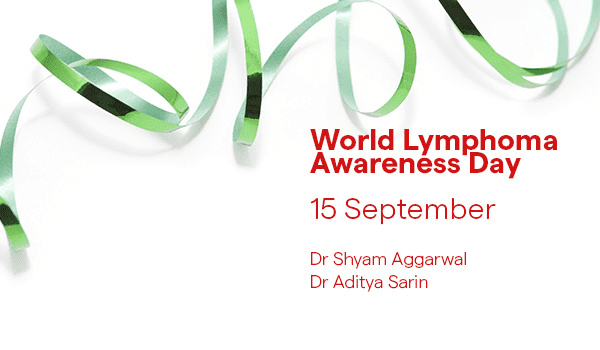
Dr Shyam Aggarwal, Senior Consultant, Medical Oncology
Dr Aditya Sarin, Associate Consultant, Medical Oncology
The 15th of September is World Lymphoma Awareness Day, a day dedicated to raising awareness about lymphoma and its impact on the lives of individuals. This day has great significance for oncologists in India because it provides an opportunity to educate and empower patients with knowledge about this complex group of diseases.
In India, lymphoma, a type of cancer that originates in the lymphatic system, is a developing concern. The incidence of lymphoma has increased in the country as a whole, with Non-Hodgkin lymphoma (NHL) being the most prevalent form. Despite this, there is still a lack of awareness about lymphoma, its symptoms, risk factors, and available treatments among the general population. As oncologists, it is our responsibility to assist our patients make informed health decisions by bridging this information gap.
Understanding the Types, Symptoms, and Risk Factors of Lymphoma
Lymphoma is a heterogeneous group of cancers that affect lymphocytes, which play an essential function in the immune system. Hodgkin lymphoma (HL) and Non-Hodgkin lymphoma (NHL) are the two most common forms of lymphoma. Both categories can manifest in a variety of subtypes, each with its own distinct characteristics and treatment strategies.
Recognising lymphoma symptoms is crucial for early diagnosis and effective treatment. Patients must recognise warning symptoms such as lymph node enlargement, unexplained weight loss, fatigue, night sweats, and itching. If these symptoms persist, a healthcare professional, preferably an oncologist, should be consulted for further evaluation.
Multiple risk factors contribute to lymphoma development. While some factors are beyond our control, such as genetics, others are influenced by lifestyle choices. Lymphoma risk can be increased by chronic infections, immunodeficiency disorders, exposure to certain substances, and an impaired immune system due to conditions such as HIV/AIDS. By educating our patients on these risk factors, we empower them to take preventative measures.
Awareness and Early Detection Promotion
The purpose of World Lymphoma Awareness Day is to educate the public about lymphoma, its subtypes, and the significance of early detection. Through seminars, webinars, social media campaigns, and awareness campaigns, oncologists and medical professionals can dispel misconceptions and provide accurate information to the general public. In India, where health literacy levels vary considerably, these efforts are essential for dispelling myths and encouraging people to prioritise their health.
Lack of awareness leading to delayed diagnosis is one of the most significant obstacles in lymphoma diagnosis and treatment. A delayed diagnosis can confound treatment and diminish its efficacy. By educating patients about symptoms and the importance of prompt medical attention, we can facilitate earlier diagnosis and improved outcomes.
Managing Treatment and Support Options
Understanding treatment options and making informed decisions can be overwhelming for lymphoma patients. As oncologists, we must provide emotional support and guidance to our patients throughout their voyage in addition to administering medical treatments.
Lymphoma treatment depends on a number of factors, including the form of lymphoma, its stage, the patient's age, and their overall health. Chemotherapy, radiation therapy, targeted therapies, and stem cell transplantation are all possible treatments. It is essential to inform patients of the potential benefits, risks, and adverse effects of each treatment option so that they can actively participate in the decision-making process.
Additionally, patients and their families should understand the significance of psychosocial support. The emotional impact of a cancer diagnosis can be substantial, and connecting patients with support groups, counselling services, and survivor networks can assist them in coping with the difficulties they confront.
Revolutionizing Lymphoma Treatment: The Promise of CAR-T Cell Therapy
In the realm of lymphoma treatment, there exists a groundbreaking innovation known as Chimeric Antigen Receptor T-cell (CAR-T) therapy. This cutting-edge technology has transformed the landscape of cancer treatment and offers newfound hope for patients with relapsed or refractory lymphomas.
CAR-T therapy involves the genetic modification of a patient's own T-cells, a type of immune cell, to equip them with a receptor that can recognize and attack cancer cells with precision. This personalized approach has shown remarkable success in treating certain types of lymphoma that are resistant to conventional therapies.
In the Indian context, CAR-T therapy has introduced a ray of optimism, especially for patients who have exhausted other treatment options. However, it's important to note that CAR-T therapy is not without challenges, including its high cost and potential side effects. As oncologists, we must ensure that our patients are well-informed about the benefits, risks, and potential outcomes of CAR-T therapy, enabling them to make informed decisions about their treatment journey.
Advocating for the accessibility and affordability of CAR-T therapy in India is also paramount. Collaborative efforts between medical professionals, research institutions, and policymakers are essential to make this innovative therapy available to a broader spectrum of lymphoma patients, ensuring that cutting-edge treatments are not restricted by financial barriers.
On this World Lymphoma Awareness Day, as we illuminate the path toward greater understanding and improved care for lymphoma patients, let us also celebrate the transformative potential of CAR-T cell therapy in reshaping the future of lymphoma treatment in India.